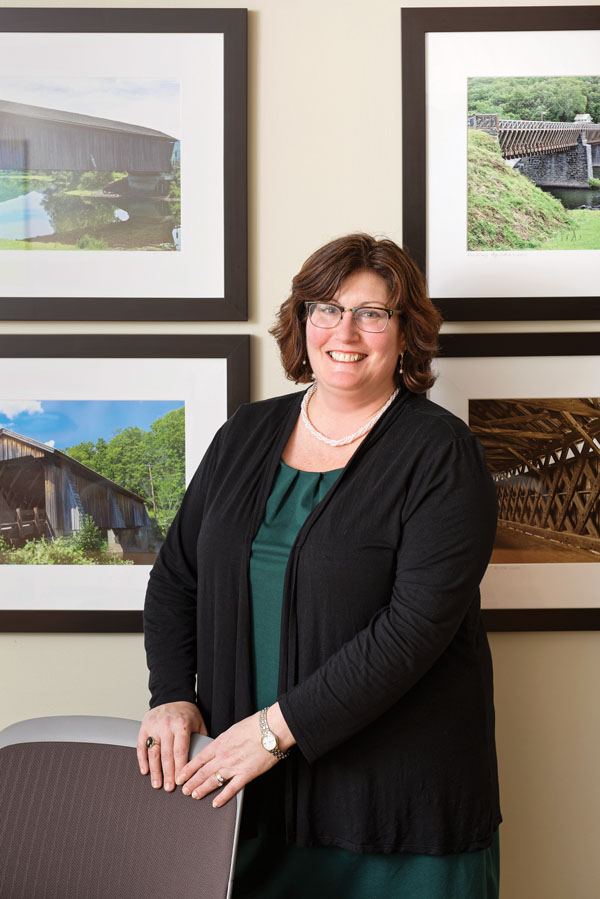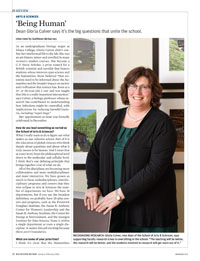In Review
 RECOGNIZING RESEARCH: Gloria Culver, new dean of the School of Arts & Sciences, says supporting faculty research is key to everything in the school: “The teaching will be better, the research will be better, and the students involved in research will get more out of it.” (Photo: Brandon Vick)
RECOGNIZING RESEARCH: Gloria Culver, new dean of the School of Arts & Sciences, says supporting faculty research is key to everything in the school: “The teaching will be better, the research will be better, and the students involved in research will get more out of it.” (Photo: Brandon Vick)As an undergraduate biology major at Ithaca College, Gloria Culver didn’t confine her intellectual life to the lab. She was an art history minor and enrolled in many women’s studies courses. She became a C. P. Snow Scholar, a prize named for a British scientist and novelist that honors students whose interests span science and the humanities. Snow believed “that scientists need to be informed about the humanities and the broader impact on society and civilization that science has. Even as a 19- or 20-year-old, I saw and was taught that this is a really important intersection,” says Culver, a biology professor whose research has contributed to understanding how infections might be controlled, with implications for reducing harmful bacteria, including “super-bugs.”
Her appointment as dean was formally celebrated in December.
How do you lead something as varied as the School of Arts & Sciences?
What I really want to do is figure out what makes us one cohesive school. Part of it is the education of global citizens who think deeply about questions and about what it truly means to be human. And I mean that at every level, from the philosophical level down to the molecular and cellular level. I think that’s one defining principle that brings together a lot of what we do.
All of the disciplines are becoming more collaborative and more multidisciplinary and more interactive. We have grown so much in these multidisciplinary, interdisciplinary programs and centers that they now eclipse in Arts & Sciences the number of departments we have. We have 18 departments, but if you use the broadest definition, we probably have 25-plus centers and programs, such as the Frederick Douglass Institute, the Susan B. Anthony Center for Women’s Leadership and the Susan B. Anthony Institute, the Center for Energy & Environment, and the Goergen Institute for Data Science. None is within a single department or even a single discipline. It makes this job exciting because there aren’t boundaries.
What are some of your priorities?
I think it’s clear that the Humanities Center and the Institute for Performing Arts are priorities that have recently been launched but still need much attention to become long-term successes. The center examines human culture in its many forms and offers programs for faculty, students, and the public. And the institute brings together our programs in music, theater, and dance to inspire more students to explore the arts.
Additionally, something I think is hugely important is trying to find a way to support the research of our faculty. And so I’m working with Dave Williams, who’s the dean of research for Arts, Sciences & Engineering, to figure out—given the decrease in funding from the National Institutes of Health and the National Science Foundation and the National Endowment for the Arts and the National Endowment for the Humanities, all things that affect the School of Arts & Sciences—how we can help our faculty maintain their level of research. How do we help them be competitive for getting the limited number of funds that are available? It’s something that affects every faculty member in this school.
How can you address that?
We have internal funding mechanisms—they’re called “pump primers.” These are grants that are given by Arts, Sciences & Engineering to try to help people get preliminary data or try out new ideas or have meetings with collaborators to come up with research proposals. We also are doing things like boot camps on grant writing. And we’re trying to get analytics on how our departments specifically compare to our peer-group departments. Are there areas where they are doing much better than we are, either in awards or citations or honorifics? And if so, why are they doing better? And what can we do to support the faculty so that they do as well as their peers?
You have to gather the data over time, and so it’s not an easy fix. But if it were easy, everyone would do it. The easy things have been done, and they’ve been done over and over and over again. And so, what can we do differently? How can we be creative?
Part of our strength is our amazing undergraduate population. How do we include them in what we’re doing, such that it gives us a different edge? One place where we’ve been very successful lately is in the National Science Foundation Career Award grants. These are only for junior faculty. They have a big research component, but they absolutely must have a novel teaching component, and that teaching component has got to be undergraduate, generally. I think this is one space where we might have a niche that we can really explore and expand on.
What are other priorities?
I would like to strengthen our faculty. I’d also like to strengthen the experiential learning that our faculty does with our undergraduates. It’s about getting students out there, doing things—research, education abroad, involvement in the community—as opposed to sitting in a lecture hall. I think that’s hugely important.
And this gets to the research support, but I think that we need to find ways of supporting our faculty—endowed professorships, things like that. If we strengthen the faculty generally that will bring everything in the school up. The teaching will be better, the research will be better, and the students involved in research will get more out of it.
In your remarks at your investiture, you said that thinking broadly is the school’s future, and that Arts & Sciences is “grounded in questions of global inquiry and an understanding of what it means to exist.” How so?
I think we rarely speak in broader terms of what we’re really doing and how it addresses what happens in society. But if you look around at the sort of race questions and medical questions and ethical questions and political questions that are asked in the departments here, those are the things that you hear about on NPR every morning, right? Those are the things that the faculty here are addressing and that they’re teaching our students. And I think the ultimate reward of being a successful academic is knowing that you have students who go out in the world and make a difference. And that’s what we do, if we’re good and we’re lucky.
What is your view of falling enrollments nationally in the humanities?
I find it incredibly disturbing that enrollments in the humanities are down so much. I worry about the fate of students who leave universities with very little exposure to the humanities. How are they going to think about world issues and societal issues, and how are they going to come to terms with broad questions if they don’t have the intellectual background to think about them?
What do you like best about the job so far?
My favorite part is the people I get to interact with, and talking to people about their interests. The best part of my job is that I can talk to a linguist, an astronomer, a political scientist, and a chemist—and that’s just the first two hours of my day. How fun is that?
To me, the people and the ideas and trying to figure out how to let people thrive and take these new ideas that they have and work through the next possible steps—it’s fun. I have been quoted saying that I can’t believe I get paid to do this. And there are days when I don’t feel that way. But it’s really an intellectual luxury.
I think the University is poised to do some amazing things, between the strength in our sciences and our engineering school, what we have in music, what we have in the medical school, and the foundation in undergraduate education and arts and sciences. It’s a privilege to be here. What I would hope is that we have the ability to really move some of these ideas forward. Part of that is funds, part of that is motivation, part of that is the willingness of people to do some hard things—but I think we have all of the right pieces.
It’s about doing the difficult things and finding opportunities that have been unrealized and making them happen. And sometimes failing. I guess that’s my research background: you do a lot of experiments. Some of them fail, some of them are ambiguous, and some are successes. And then you take the successes to the next step. And sometimes you pull out the failures and you try again later on, because you have new technology, or new people, or new ideas.
So that’s what I get to do every day.

